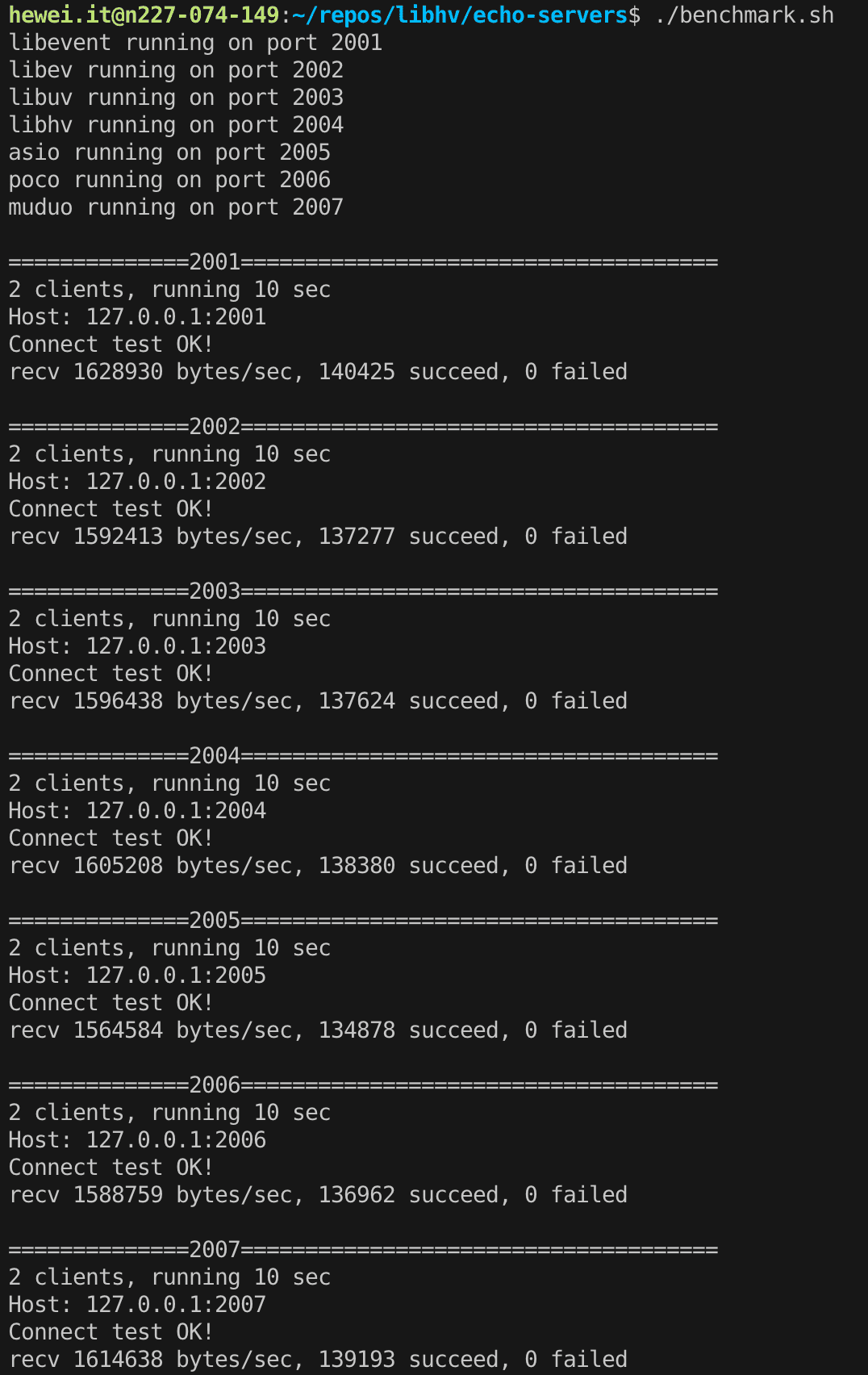Like libevent, libev, and libuv,
libhv provides event-loop with non-blocking IO and timer,
but simpler api and richer protocols.
- cross-platform (Linux, Windows, Mac, Solaris)
- event-loop (IO, timer, idle)
- ENABLE_IPV6
- ENABLE_UDS (Unix Domain Socket)
- WITH_OPENSSL or WITH_MBEDTLS
- http client/server (include https http1/x http2 grpc)
- http web service, indexof service, api service (support RESTful API)
- protocols
- dns
- ftp
- smtp
- apps
- ifconfig
- ping
- nc
- nmap
- nslookup
- ftp
- sendmail
- httpd
- curl
./getting_started.sh
see examples/http_server_test.cpp
#include "HttpServer.h"
int main() {
HttpService service;
service.GET("/ping", [](HttpRequest* req, HttpResponse* resp) {
resp->body = "pong";
return 200;
});
service.POST("/echo", [](HttpRequest* req, HttpResponse* resp) {
resp->content_type = req->content_type;
resp->body = req->body;
return 200;
});
http_server_t server;
server.port = 8080;
server.service = &service;
http_server_run(&server);
return 0;
}see examples/http_client_test.cpp
#include "requests.h"
int main() {
auto resp = requests::get("http://www.example.com");
if (resp == NULL) {
printf("request failed!\n");
} else {
printf("%d %s\r\n", resp->status_code, resp->status_message());
printf("%s\n", resp->body.c_str());
}
auto resp = requests::post("127.0.0.1:8080/echo", "hello,world!");
if (resp == NULL) {
printf("request failed!\n");
} else {
printf("%d %s\r\n", resp->status_code, resp->status_message());
printf("%s\n", resp->body.c_str());
}
return 0;
}git clone https://github.com/ithewei/libhv.git
cd libhv
make httpd curl
bin/httpd -h
bin/httpd -d
#bin/httpd -c etc/httpd.conf -s restart -d
ps aux | grep httpd
# http web service
bin/curl -v localhost:8080
# http indexof service
bin/curl -v localhost:8080/downloads/
# http api service
bin/curl -v localhost:8080/ping
bin/curl -v localhost:8080/echo -d "hello,world!"
bin/curl -v localhost:8080/query?page_no=1\&page_size=10
bin/curl -v localhost:8080/kv -H "Content-Type:application/x-www-form-urlencoded" -d 'user=admin&pswd=123456'
bin/curl -v localhost:8080/json -H "Content-Type:application/json" -d '{"user":"admin","pswd":"123456"}'
bin/curl -v localhost:8080/form -F "user=admin pswd=123456"
bin/curl -v localhost:8080/upload -F "file=@LICENSE"
bin/curl -v localhost:8080/test -H "Content-Type:application/x-www-form-urlencoded" -d 'bool=1&int=123&float=3.14&string=hello'
bin/curl -v localhost:8080/test -H "Content-Type:application/json" -d '{"bool":true,"int":123,"float":3.14,"string":"hello"}'
bin/curl -v localhost:8080/test -F 'bool=1 int=123 float=3.14 string=hello'
# RESTful API: /group/:group_name/user/:user_id
bin/curl -v -X DELETE localhost:8080/group/test/user/123
# webbench (linux only)
make webbench
bin/webbench -c 2 -t 60 localhost:8080libhv(port:8080) vs nginx(port:80)

see examples/tcp_echo_server.c examples/udp_echo_server.c examples/nc.c
// TCP echo server
#include "hloop.h"
void on_close(hio_t* io) {
}
void on_recv(hio_t* io, void* buf, int readbytes) {
hio_write(io, buf, readbytes);
}
void on_accept(hio_t* io) {
hio_setcb_close(io, on_close);
hio_setcb_read(io, on_recv);
hio_read(io);
}
int main(int argc, char** argv) {
if (argc < 2) {
printf("Usage: cmd port\n");
return -10;
}
int port = atoi(argv[1]);
hloop_t* loop = hloop_new(0);
hio_t* listenio = hloop_create_tcp_server(loop, "0.0.0.0", port, on_accept);
if (listenio == NULL) {
return -20;
}
hloop_run(loop);
hloop_free(&loop);
return 0;
}make examples
bin/tcp_echo_server 1234
bin/nc 127.0.0.1 1234
bin/tcp_chat_server 1234
bin/nc 127.0.0.1 1234
bin/nc 127.0.0.1 1234
bin/httpd -s restart -d
bin/tcp_proxy_server 1234 127.0.0.1:8080
bin/curl -v 127.0.0.1:8080
bin/curl -v 127.0.0.1:1234
bin/udp_echo_server 1234
bin/nc -u 127.0.0.1 1234see BUILD.md
- make libhv
- sudo make install
- make examples
- make unittest
Enable SSL in libhv is so easy, just only two apis:
// init ssl_ctx, see base/hssl.h
hssl_ctx_t hssl_ctx_init(hssl_ctx_init_param_t* param);
// enable ssl, see event/hloop.h
int hio_enable_ssl(hio_t* io);
https is the best example.
sudo apt install openssl libssl-dev # ubuntu
make clean
make WITH_OPENSSL=yes
# editor etc/httpd.conf => ssl = on
bin/httpd -s restart -d
bin/curl -v https://localhost:8080
curl -v https://localhost:8080 --insecure
make WITH_CURL=yes DEFINES="CURL_STATICLIB"
sudo apt install libnghttp2-dev # ubuntu
make clean
make WITH_NGHTTP2=yes
bin/httpd -d
bin/curl -v localhost:8080 --http2
see config.mk
cd echo-servers
./build.sh
./benchmark.sh